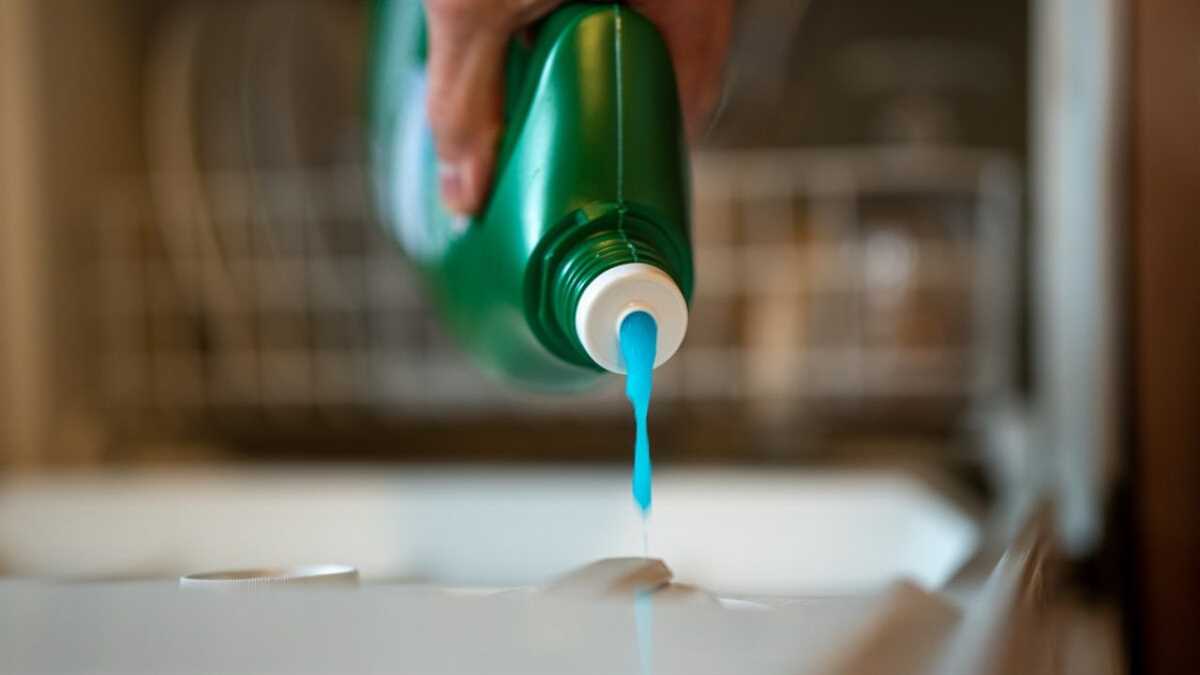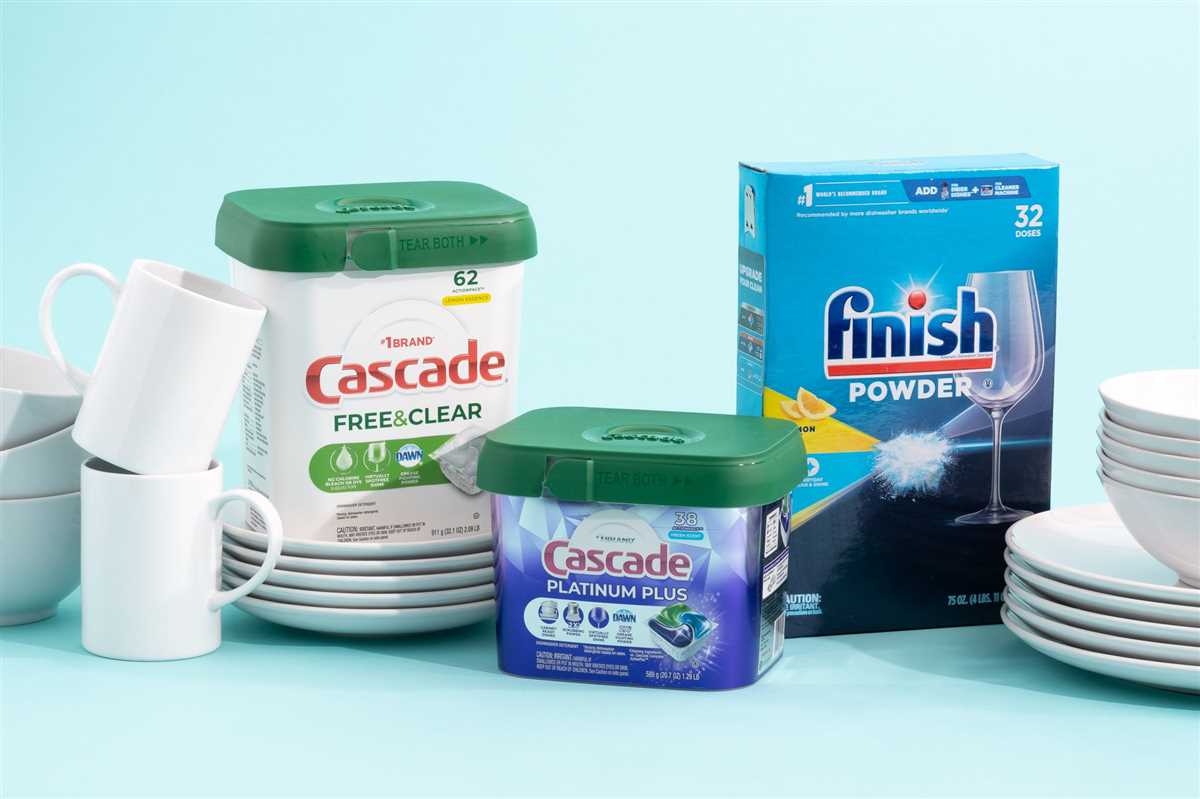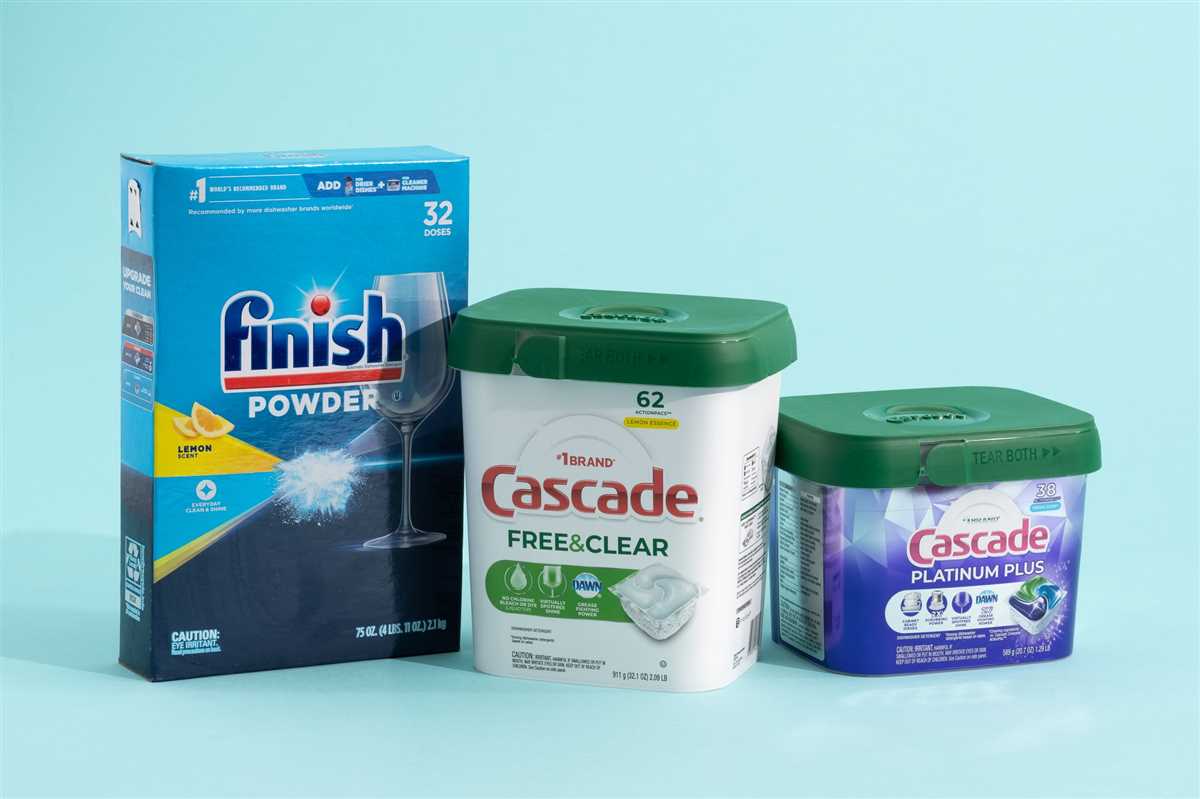




Are you tired of dealing with cloudy glasses and spotty dishes even after running them through the dishwasher? If you live in an area with hard water, this is a common problem that can be quite frustrating. But don’t worry, we’ve got you covered!
In this ultimate guide, we will delve into the world of liquid dishwasher detergents specifically formulated to tackle hard water. We understand that finding the right detergent can be overwhelming, with so many options available on the market. That’s why we have done extensive research and testing to narrow down the list to bring you the best recommendations.
With our guide, you’ll learn about the key ingredients that make a detergent effective in hard water conditions. We’ll also review the top liquid dishwasher detergents, highlighting their features, pros, and cons. Whether you’re looking for a budget-friendly option or a premium product, we’ll provide you with options that suit every need and budget.
In addition, we’ll provide useful tips and tricks for getting the best results when using liquid dishwasher detergent in hard water. From adjusting your dishwasher settings to incorporating rinse aids, we’ll share expert advice that will help you achieve sparkling clean dishes every time.
Say goodbye to pesky water spots and hello to crystal clear glassware with our ultimate guide to the best liquid dishwasher detergent for hard water. Let’s dive in and discover the perfect solution for your dishwashing needs!
Why is finding the best liquid dishwasher detergent for hard water important?
Choosing the right dishwasher detergent is crucial when dealing with hard water. Hard water can leave behind mineral deposits that can build up on dishes, glasses, and silverware, leaving them looking dull and filmy.
Using the best liquid dishwasher detergent specifically formulated for hard water can help prevent this buildup and leave your dishes clean and spotless. These detergents are designed to effectively remove mineral deposits, dissolve grease and stains, and prevent redepositing of particles.
Without the right detergent, you may find yourself needing to rinse your dishes again after they come out of the dishwasher, or you may need to resort to hand washing to get rid of stubborn spots and residues. This not only wastes time and water but can also be frustrating.
Additionally, using the wrong detergent for hard water can lead to damage to your dishwasher. Mineral deposits can accumulate inside the machine, affecting its performance and efficiency over time. This can result in higher energy consumption and costly repairs.
By investing in the best liquid dishwasher detergent for hard water, you can ensure that your dishes come out sparkling clean, prevent damage to your dishwasher, and save time and effort in the long run. It’s a small investment that can make a big difference in your daily dishwashing routine.
Factors to Consider When Choosing a Liquid Dishwasher Detergent for Hard Water
When selecting a liquid dishwasher detergent for hard water, there are several important factors to consider. Choosing the right detergent can make a significant difference in the effectiveness of your dishwasher, as well as the cleanliness of your dishes. Here are some key factors to keep in mind:
- Phosphate Content: Check the phosphate content of the detergent. Phosphates can help soften hard water, making it easier for the detergent to remove stains and residue from your dishes.
- Chelating Agents: Look for detergents that contain chelating agents. These agents bind to minerals in hard water, preventing them from interfering with the detergent’s cleaning power. Common chelating agents include citric acid and sodium citrate.
- Enzymes: Consider whether the detergent contains enzymes. Enzymes can help break down tough food stains and greasy residue, improving the overall cleaning performance of the detergent.
- Sudsing: Take into account the sudsing capabilities of the detergent. Some detergents produce more suds than others, which may affect the performance of your dishwasher. If you have a low-sudsing dishwasher, look for a detergent specifically formulated for this type of machine.
- Spot and Residue Prevention: Consider whether the detergent offers spot and residue prevention. Look for formulations that have additives to prevent water spots and leave your dishes looking clean and shiny.
- Allergies and Sensitivities: If you or anyone in your household has allergies or sensitivities, make sure to choose a detergent that is free from fragrances and harsh chemicals that may cause skin irritation.
By considering these factors, you will be able to make an informed decision when selecting a liquid dishwasher detergent that is best suited for your hard water conditions. Remember that what works for one person may not work for another, so it may take some trial and error to find the perfect detergent for your needs.
Tips for using liquid dishwasher detergents in hard water areas
Hard water can pose a challenge when it comes to cleaning dishes in a dishwasher. The minerals in hard water can leave behind residue and make it difficult for dishwashing detergents to dissolve properly. However, with the right techniques and products, you can still achieve sparkling clean dishes in hard water areas. Here are some tips:
- Pre-rinse dishes: Before loading your dishes into the dishwasher, it’s a good idea to give them a quick rinse to remove any food particles or debris. This will help prevent build-up and ensure that the detergent can do its job effectively.
- Use the right amount of detergent: Follow the manufacturer’s instructions on the packaging to determine the correct amount of liquid dishwasher detergent to use. Using too little may result in inadequate cleaning, while using too much can leave behind a sticky residue. Finding the right balance is essential for optimal results.
- Check the hardness level: Consider testing the hardness level of your water using a water hardness testing kit. This will help you determine the appropriate amount of detergent to use and allow you to adjust accordingly. Different brands of detergents may require different amounts based on the hardness of your water, so it’s important to be aware of this factor.
- Use a rinse aid: In hard water areas, using a rinse aid in addition to your liquid dishwasher detergent can be beneficial. A rinse aid helps to prevent spotting and streaking on your glassware and dishes. It works by reducing the surface tension of the water, allowing it to run off more easily and leave your dishes sparkling.
- Consider a water softener: If you have extremely hard water, you may want to consider investing in a water softener. A water softener removes the minerals that cause hardness from the water, making it easier for detergents to dissolve and clean effectively. This can result in improved overall dishwasher performance and cleaner dishes.
By following these tips, you can overcome the challenges of hard water and achieve excellent cleaning results with your liquid dishwasher detergent. Experiment with different brands and techniques to find the combination that works best for you in your specific hard water area. With a little trial and error, you’ll be able to enjoy spotless dishes every time.
The benefits of using the best liquid dishwasher detergent for hard water
When it comes to washing dishes in areas with hard water, using the best liquid dishwasher detergent can make a world of difference. Hard water contains high levels of mineral deposits, such as calcium and magnesium, which can leave behind residues and spots on glassware and dishes. By using a high-quality liquid dishwasher detergent specifically designed for hard water, you can enjoy several benefits.
- Efficient cleaning: The best liquid dishwasher detergent for hard water is formulated to effectively remove tough stains and deposits caused by hard water minerals. Its powerful cleaning agents can break down stubborn food residues, oils, and grease, leaving your dishes sparkling clean.
- Spot-free results: One of the main challenges of washing dishes in hard water is the formation of unsightly spots and film on glassware and dishes. The best liquid dishwasher detergents for hard water contain special ingredients that help prevent the formation of spots, ensuring your dishes come out looking spot-free and crystal clear.
- Improved dishwasher performance: Hard water minerals can build up inside your dishwasher over time, affecting its efficiency and performance. Using a liquid dishwasher detergent formulated for hard water can help prevent mineral deposits from accumulating in your dishwasher, ensuring it functions optimally for longer.
- Time and cost savings: With the best liquid dishwasher detergent for hard water, you can save time and money by reducing the need for rewashing or handwashing dishes. Its powerful formula can tackle tough stains and residues in a single wash, saving you valuable time and eliminating the need for additional cleaning products.
- Environmentally friendly: Many of the best liquid dishwasher detergents for hard water are environmentally friendly, containing biodegradable ingredients that are safe for both the planet and your family. Choosing an eco-friendly detergent ensures that you are effectively cleaning your dishes while minimizing your impact on the environment.
Overall, using the best liquid dishwasher detergent for hard water can result in cleaner dishes, spot-free results, improved dishwasher performance, time and cost savings, and a reduced impact on the environment. By investing in a quality detergent, you can transform your dishwashing experience in hard water areas and enjoy the benefits of crystal-clear, spotless dishes every time.
FAQs about Liquid Dishwasher Detergents for Hard Water

1. What is hard water?
Hard water is water that contains a high mineral content, particularly calcium and magnesium. This can cause problems when washing dishes as it can leave behind mineral deposits and residue, making them appear dull and dirty. Using a liquid dishwasher detergent specifically designed for hard water can help to combat this issue.
2. How do liquid dishwasher detergents for hard water work?

Liquid dishwasher detergents for hard water are formulated with special ingredients that are effective at reducing the impact of minerals in the water. These detergents contain water softeners, enzymes, and surfactants that help to remove mineral deposits and leave dishes sparkling clean.
3. Are liquid dishwasher detergents better than powder detergents for hard water?

Both liquid and powder dishwasher detergents can be effective in hard water conditions. However, liquid detergents are often preferred as they tend to dissolve more easily and quickly, ensuring optimal cleaning performance. Additionally, liquid detergents can be more gentle on delicate dishes and glassware.
4. Can I use liquid dishwasher detergent for hard water in a regular dishwasher?
Yes, you can use liquid dishwasher detergent for hard water in any regular dishwasher. These detergents are designed to work in all types of dishwashers and are compatible with different water hardness levels. Just follow the instructions on the detergent packaging for best results.
5. How much liquid dishwasher detergent should I use for hard water?
The amount of liquid dishwasher detergent needed for hard water depends on the hardness of the water and the dishwasher’s capacity. It’s best to consult the detergent packaging for specific dosage instructions. In general, using too much detergent can lead to residue on dishes, while using too little may result in inadequate cleaning.
6. What other tips can help improve dishwasher performance in hard water?
In addition to using a liquid dishwasher detergent for hard water, there are several other tips that can help improve dishwasher performance. Pre-rinsing dishes, using a rinse aid, regularly cleaning the dishwasher, and periodically descaling the dishwasher can all contribute to better results in hard water conditions.
5 Best liquid dishwasher detergent for hard water
Features
| Part Number | 3181453_7 |
| Model | 3181453_7 |
| Color | Multi-coloured |
| Size | 7 Confezioni da 30 Lavaggi |
Features
| Part Number | ABB60-1 |
| Model | ABB60-1 |
Features
| Part Number | 318.5 |
| Model | 318.5 |
| Size | 5 l (Pack of 1) |
Features
| Part Number | 303 |
| Model | 303 |
| Size | 5 l (Pack of 1) |
Video
FAQ
What is hard water?
Hard water is water that contains a high concentration of minerals, such as calcium and magnesium. These minerals can interfere with the effectiveness of liquid dishwasher detergents and leave behind deposits on your dishes.
Can liquid dishwasher detergents work effectively in hard water?
Yes, there are liquid dishwasher detergents specifically formulated for hard water. These detergents contain ingredients that can effectively remove mineral deposits and provide a thorough clean for your dishes.
How do I know if I have hard water?
You can usually tell if you have hard water by looking for signs such as white spots or residues on your dishes or glassware, soap scum in the shower or bathtub, or a reduced lather when using soap or shampoo.
Do I need to use a rinse aid with liquid dishwasher detergents for hard water?
Using a rinse aid in addition to a liquid dishwasher detergent can be beneficial in hard water areas. A rinse aid can help prevent water spots and improve drying performance, leaving your dishes sparkling clean.
Conclusion
In conclusion, choosing the right liquid dishwasher detergent for hard water can make a significant difference in the effectiveness of your dishwasher and the cleanliness of your dishes. By understanding the common FAQs surrounding this topic, such as how hard water affects dishwashing, what to look for in a detergent, and how to prevent residue and film, you can confidently select the best detergent for your needs. Remember to consider factors such as water hardness, detergent ingredients, and customer reviews when making your decision. With the right knowledge and product, you can enjoy sparkling clean dishes every time you run your dishwasher, even in hard water conditions.










